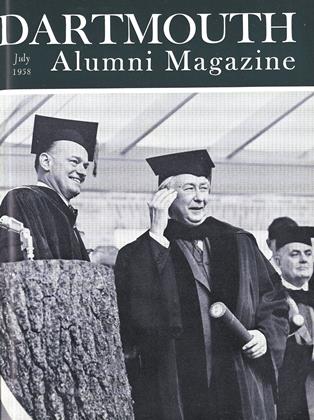By RobertColborn '33. Boston: Beacon Press, 1958.184 pp. $3.50.
In the years we have lived with "massive retaliation" how many have considered the full significance of those words? "Massive": weapons of total, indiscriminate destruction; "retaliation": an eye for an eye, a city for a city. To what moral position does implication in such policy commit each of us? This is the crux of Robert Colborn's novel, TheFuture Like A Bride.
Arthur Random, a detached, intellectual physicist, views commitment outside his lab as danger; but narrowness prevents him from fulfilling more worldly needs, especially those of his wife, Helen. Primarily through her efforts, he is induced to forego the egg-like security of administering a weapons project for the reality of policy-making as an Atomic Energy Commissioner. But if, in ten years, Washington teaches him the politics of compromise, it isolates him still further from human hopes and desires. Believing the knowledge of weapons burned into the brains of their creators will eventually scorch a soon-to-be-ratified Disarmament Treaty, he helps set up a secret retaliation force for "protection" against international blackmail. But participation in the violation of the Treaty's spirit divorces Random from his closest friend and from his anchor in humanity, Helen. And for what? Years later, the terrible occasion for retaliating massively arisen, Random finds he cannot act: to do so would push world-wide radiation beyond human endurance. His nation's life must serve as ransom for the race's.
While the importance of Mr. Colborn's book arises from its subject, two thirds of the novel sketches the symbolic background of Random's scientific and Helen's carnal experiences. Of Random's moral crises, however, we encounter mainly effects, and those distantly. But if the book does not fully dramatize the consequences of one man's commitment to the politics of vengeance, it does face us with the ethical questions of nuclear policy which we, like Random, must solve to survive.
 View Full Issue
View Full Issue
More From This Issue
-
 Feature
FeatureThe Examined Life
July 1958 By THE REV. THEODORE M. HESBURGH -
 Feature
FeatureThe 1958 Commencement
July 1958 By C.E.W. -
 Feature
FeatureHONORARY DEGREE CITATIONS
July 1958 -
 Feature
FeatureSix Alumni Awards Bestowed
July 1958 -
 Feature
FeatureThe Capital Gifts Campaign To Date
July 1958 -
 Feature
FeatureThe Seniors' Valedictory
July 1958 By JAEGWON KIM '58
Books
-
 Books
BooksR. J. Lougee '27 is the author of Time
April1935 -
 Books
BooksAlumni Articles
FEBRUARY 1970 -
 Books
BooksTHE CHRISTIAN FUTURE, OR THE MODERN MIND OUTRUN
June 1946 By C. Page Smith '40. -
 Books
BooksStar-Studded Life
February 1976 By J.B. WATSON JR. -
 Books
BooksOUTDOOR RECREATION LEGISLATION AND ITS EFFECTIVENESS
JUNE 1930 By Ralph P. Holben -
 Books
BooksTHE PAGEANT OF AMERICA
AUGUST, 1928 By W. R. Waterman

